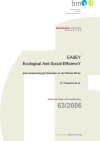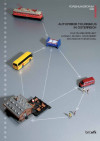Suchergebnisse
EMA Mikro-Makro-Link
Kern des Projektes war die Darstellung der Harmonisierungsanforderungen der Berichte an die statistischen Organisationen hinsichtlich Material- und Energieeinsatz, Umweltinvestitionen und laufendem Aufwand mit der IFAC Leitlinie für Umweltkosten und dem Leitfaden zu Nachhaltigkeitskennzahlen der Global Reporting Initiative.
EMA Mikro-Makro-Link
Focus of the project was the harmonisation of disclosure reqirements to statistical agencies regarding material and energy consumption, environmental investments and expenditure with the IFAC guidance document on environmental management accounting and the GRI guideline regarding sustainability performance indicators.
PolyBacTex - Umwandlung gemischter Textilabfälle in Recyclingfasern und Zellulose für eine nachhaltige Produktion
Das Projekt PolyBacTex entwickelt eine Lösung zum Recycling von Mischtextilien, indem die einzelnen Fasertypen (Cellulose und Polyester) chemisch getrennt und biotechnologisch aufgewertet werden. Dadurch können Cellulose-Fasern rückgewonnen und zurück in den Prozess der Faserherstellung gebracht werden.
EASEY - Ecological And Social EfficiencY

eine Anwendung als Subindex an der Wiener Börse
Schriftenreihe
63/2006
R. Paulesich et al.
Herausgeber: BMVIT
Deutsch, 112 Seiten
Downloads zur Publikation
Carless Tourism In Austria

The valleybus project Lungau, Murau, Nockgebiet - an innovative pilot scheme
Forschungsforum
3/1995
Herausgeber: BMVIT
Englisch, 6 Seiten
EMA - Environmental Management Accounting - Pilot-testing
Training kit for environmental management accounting and investment appraisal
Berichte aus Energie- und Umweltforschung 17/1996 Österreichischer Cleaner Production Roundtable 1996

Tagungsband der Veranstaltung in Linz, 12. November 1996
Berichte aus Energie- und Umweltforschung 10/2001 ECODESIGN als Strategieelement für Umweltmanagement

Methodischer Ansatz für Produktentwicklung nach ECODESIGN-Kriterien als Strategie für vorsorgendes betriebliches Umweltmanagement.
Berichte aus Energie- und Umweltforschung 21/1997 Österreichischer Cleaner Production Roundtable 1997

Tagungsband der Veranstaltung, 11. November 1997, Graz
FABRIK der Zukunft Hintergrundband Teil 1
Der vorliegende Hintergrundband soll einen umfassenden Überblick über die hervorragenden Ergebnisse aus der Programmlinie "Fabrik der Zukunft" geben, wobei insbesondere die Projekte der 1. und 2. Ausschreibung der Programmlinie dargestellt werden.
Optimierung der Ressourceneffizienz der Holznutzung
Modellierung der Holzverarbeitungsprozesse zur Darstellung der Auswirkungen von Entwicklungen auf die Leistungscharakteristik
What does sustainability mean for a cluster in industry?
Inquiry of requirements, implementation of qualification schemes and coaching in the design of sustainability reports for selected companies of the styrian automobile cluster with special emphasis on environmental and social costs.
Energy Services as an Integral Part of the Distribution
Concept development for the implementation of efficient energy services as part of grid connected energy supply to increase energy end-use efficiency.
Was bedeutet "Nachhaltigkeit" für einen Industriecluster?
Erhebung der Anforderungen, Durchführung von Qualifikationsmaßnahmen und Erstellung eines Nachhaltigkeitsberichts für den Cluster bei weitestgehender Monetarisierung der Effekte einer nachhaltigen Wirtschaftsentwicklung.
Berichte aus Energie- und Umweltforschung 16/1996 Zielerreichungsbeiträge von Cleaner Production-Projekten

Eine volkswirtschaftliche Analyse am Beispiel der österreichischen PREPARE-Programmes
Berichte aus Energie- und Umweltforschung 11/1997Verbreitungsstrategien für Cleaner Production in den USA

Auswertung der österreichischen Aktivitäten
Autofreier Tourismus In Österreich

Das Tälerbusprojekt Lungau, Murau, Nockgebiet - ein innovatives Model
Forschungsforum
3/1995
Herausgeber: BMVIT
Deutsch, 6 Seiten
Downloads zur Publikation
Energy Workshop Northern Waldviertel

A local " integrated" energy program - successful implementation through research cooperation
Forschungsforum
1/1996
Herausgeber: BMVIT
Englisch, 6 Seiten
Berichte aus Energie- und Umweltforschung 7/1996 Reduzierung der Unfallgefahren älterer Verkehrsteilnehmer

Modellversuch zur Entwicklung und Evaluierung eines Maßnahmenpakets
Berichte aus Energie- und Umweltforschung 8/2001 Evaluation der Cleaner Production Programme in Österreich

Gesamtschau der durch öffentliche Fördermittel teilfinanzierten Umweltprogramme und der darin eingebundenen Betriebe
